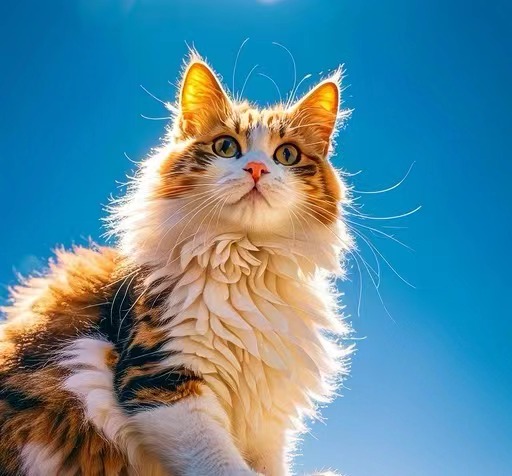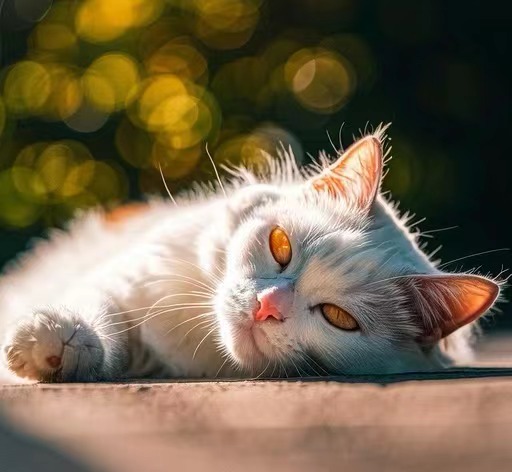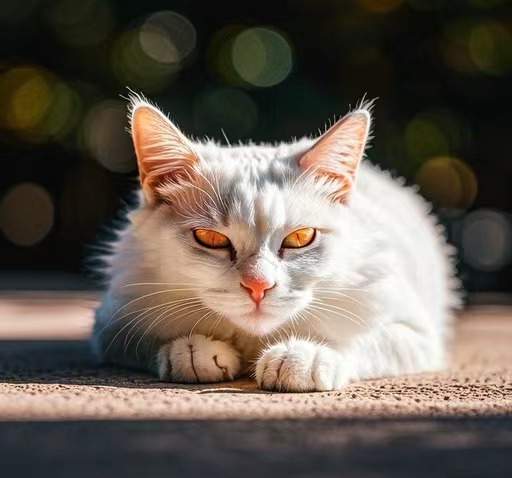
by TCMVET | Apr 24, 2024 | Cat Cancer & Tumors
As cats live longer due to advancements in science and technology, the likelihood of feline tumors has increased, surpassing the incidence rates in larger livestock. These tumors can be benign or malignant, with malignant ones posing significant risks to the health and life of cats, necessitating prompt attention.
Diagnostic Challenges in Veterinary Practice
In clinical practice, various diagnostic techniques such as palpation, visual examination, and detailed patient history are employed. However, symptoms of tumors can often be overlooked, leading to missed opportunities for timely treatment. Here are several examples of symptoms that are commonly misinterpreted:
- Lameness: If external injuries or skin diseases are ruled out, the cause of a cat’s limp might be a tumor. Initially presenting as mere lameness, further diagnostics can reveal bone tumors or even metastases compressing the spine or nerves, causing impaired mobility.
- Digestive Issues: Chronic diarrhea that persists despite treatment for common gastrointestinal issues might actually be caused by intestinal tumors.
- Urinary and Defecation Problems: Difficulties in urination or defecation without obvious causes like stones or infections could indicate tumors in the bladder, prostate, or rectal areas.
- Respiratory Distress: Difficulty breathing, initially suspected to be pneumonia or another common ailment, could in fact be an early sign of lung tumors.
- Skin and Oral Conditions: Persistent skin lesions or changes not responding to typical treatments could be signs of skin tumors such as mast cell tumors or squamous cell carcinomas. Similarly, bad breath and oral lesions might be indicative of oral cancers.
Advances in Treatment
Treatment for feline tumors can vary widely based on the type and stage of the tumor. Surgical removal remains the primary approach for many types, often followed by histopathological examination to determine the exact nature of the tumor. In cases of malignant tumors, chemotherapy and radiation therapy are also considered.
The Role of Vaccination and Injection-Site Tumors
Recent studies have highlighted a small but significant risk of injection-site tumors in cats, which can develop weeks, months, or even years after vaccination. While vaccines are crucial for preventing deadly diseases, they carry risks which, though minor, include the development of tumors at the injection sites.
Preventive Measures and Treatment Options
It’s crucial to adhere to vaccination guidelines and use vaccines as directed by manufacturers. For cats diagnosed with injection-site tumors, aggressive treatment options such as surgery, radiation, and chemotherapy are recommended. Research continues to evolve, offering new methods of treatment that are under investigation.
Vaccination and Future Care
Modern vaccines are generally safer, but no vaccine is entirely without risk. For cats that develop injection-site tumors, future vaccinations should be carefully considered and tailored to the individual’s health needs and lifestyle, based on thorough discussions with a veterinarian.
In conclusion, as the number of elderly cats increases, so does the prevalence of feline tumors. Understanding the various symptoms that could indicate the presence of a tumor and staying informed about the latest diagnostic and treatment methods can help ensure better health outcomes for our feline companions.

by TCMVET | Apr 23, 2024 | Cat Cancer & Tumors
Mammary tumors are a major health issue in older cats, accounting for about 17% of all tumors in female cats and standing as the third most prevalent tumor type. The likelihood of these tumors is increasing alongside the growing population of elderly domestic cats.
High-Risk Breeds
Domestic shorthairs and Siamese cats are particularly prone to mammary tumors, with Siamese having a notably higher incidence rate—double that of other breeds.
Early Detection
These tumors often present as hard lumps in the mammary glands and can be detected early through regular pet care activities such as bathing, grooming, or playing.
Causes and Clinical Signs
The exact causes are unclear but may be related to the use of progesterone or similar medications, with a smaller risk linked to estrogen. Symptoms depend on the tumor’s size, location, and whether it is benign or malignant. They may include weight loss, nodular swellings, and possibly ulceration in advanced stages.
Diagnosis and Treatment
Diagnosis typically begins with recognizing clinical signs and requires further examinations like biopsies to confirm if a tumor is benign or malignant. Treatment generally involves surgical removal and may include chemotherapy for malignant cases. Pre-surgical assessments such as X-rays and blood tests are crucial to minimize risks and guide recovery.
Prevention
Spaying female cats before their first estrus cycle can drastically lower the risk of developing mammary tumors. Research indicates that spayed cats are seven times less likely to develop these tumors than unspayed ones, making early spaying a key preventive measure.
Key Takeaway
Regular veterinary check-ups and close monitoring of any changes in your cat’s mammary glands are vital for early detection and effective management of mammary tumors. Spaying not only prevents unwanted litters but also significantly reduces the risk of mammary tumors, promoting a healthier life for female cats.

by TCMVET | Apr 23, 2024 | Cat Cancer & Tumors
Cancer remains a leading cause of death in mammals, including humans and pets, and presents complex challenges in treatment. As pet owners, it’s crucial to be informed about feline tumors to manage these conditions effectively when they arise. This article explores the common types of tumors in cats, their diagnosis, treatment options, and preventive measures.
Types of Common Tumors in Cats
- Soft Tissue Sarcomas:
These tumors originate from fibroblasts (cells that produce fibrous tissue) and other supportive tissues, usually developing under the skin. They vary in malignancy; some are highly aggressive, infiltrating local tissues extensively and metastasizing early to lymph nodes and lungs. Others are less aggressive and less prone to spread.
- Intestinal Adenomas:
Lymphomas and adenocarcinomas are the most prevalent tumors affecting the gastrointestinal tracts of cats. Adenocarcinomas typically involve the small or large intestines (rarely the stomach) and grow rapidly, often causing intestinal blockages. Common symptoms include loss of appetite, weight loss, vomiting, and diarrhea. These tumors frequently metastasize to local lymph nodes and extensively invade the intestinal walls.
- Mammary Tumors:
Most common in older female cats (though also seen in males and spayed females), these tumors can affect one or more mammary glands, often presenting multiple firm swellings or nodules. Over time, the skin over these nodules can ulcerate. Mammary tumors frequently spread to local lymph nodes and lungs. It’s noteworthy that mammary tumors, while less common in cats than dogs, are predominantly malignant in cats.
Diagnostic Procedures for Feline Tumors
- Observation: Regular monitoring of a cat’s behavior and physical condition is vital. Any persistent enlargement of lumps or other long-term adverse reactions, such as depression or gastrointestinal issues, should prompt a veterinary visit.
- Imaging: X-rays and ultrasound are essential to assess the abdomen and check for tumors.
- Biopsy and Biochemical Tests: Sampling local lymph nodes (through biopsy or aspiration) and blood tests are conducted to confirm the nature and extent of the tumor.
- Exploratory Surgery: When imaging is inconclusive, direct inspection and sampling of the abdomen through surgery are necessary to determine the presence and type of tumor.
Treatment Options for Feline Tumors
- Surgical Removal: Surgery is the most effective treatment for most benign tumors and is widely used if the tumor’s extent is known. It is particularly advisable for younger cats as early removal can lead to quicker and more successful recovery.
- Medication: For inoperable or malignant tumors, symptomatic treatment may include steroids, pain relievers, appetite stimulants, and nutritional supplements.
- Chemotherapy: Considered when a malignant tumor is inoperable, carries a high risk of metastasis, or has already spread. Side effects can include hair loss and bone marrow suppression.
- Radiation and Other Therapies: Techniques such as magnetotherapy, radiation therapy, and ultrasound therapy are used to treat tumors that are difficult to remove surgically, like those in the oral cavity or nasal area.
Preventive Measures
- Regular Health Checks: Especially for older cats, regular veterinary examinations can help detect diseases early.
- Neutering: Early neutering significantly reduces the risk of developing mammary tumors in female cats.
- Environmental Safety: Avoid exposing cats to areas where they might encounter chemical agents.
- Diet and Health: Providing a balanced diet and maintaining a healthy weight for cats can enhance their immune system and reduce the risk of obesity-related health issues.
Understanding these aspects of feline tumors can help cat owners manage their pets’ health more effectively and ensure a better quality of life for their feline companions.

by TCMVET | Mar 16, 2024 | Cat Cancer & Tumors
Feline Oral Squamous Cell Carcinoma (FOSCC) is a prevalent form of cancer in cats, posing significant treatment challenges. Surgical intervention is a common treatment approach. This article explores the efficacy and limitations of surgical options for treating FOSCC, providing valuable insights for cat owners.
Understanding Feline Oral Squamous Cell Carcinoma FOSCC is a malignant tumor that affects the mouth of cats, characterized by its aggressive nature and rapid progression. Early detection and treatment are crucial for the best possible outcome.
Surgical Treatment of FOSCC Surgery is often considered the primary treatment method for FOSCC. The aim is to remove the tumor and surrounding tissues to achieve clean margins, thereby reducing the risk of recurrence.
Efficacy of Surgery
- Early-Stage FOSCC: Surgery is most effective when FOSCC is diagnosed at an early stage. Complete removal of the tumor can potentially cure the disease.
- Advanced FOSCC: In advanced stages, surgery can help alleviate symptoms and improve quality of life, but complete removal may not be possible.
Types of Surgical Procedures
- Mandibulectomy or Maxillectomy: Involves removing part of the jawbone, depending on the tumor’s location.
- Glossectomy: Partial or total removal of the tongue, used in cases where the tumor affects the tongue.
- Wide Local Excision: Removal of the tumor with a margin of healthy tissue, aiming to ensure all cancer cells are removed.
Limitations and Challenges
- Recurrence: Despite successful surgery, there’s a risk of recurrence, especially if the tumor margins are not clear.
- Post-Surgical Complications: Cats may face challenges eating or drinking post-surgery, and may require special care or feeding techniques.
- Quality of Life: Decisions about surgery must balance the potential benefits with the impact on the cat’s quality of life.
Advancements in Surgical Techniques Recent advancements in veterinary surgery, including laser surgery and cryosurgery, offer new possibilities for treating FOSCC with potentially fewer complications and better outcomes.
Surgical options for Feline Oral Squamous Cell Carcinoma offer hope but come with inherent challenges and limitations. Early detection remains key to successful treatment. Cat owners facing this diagnosis should discuss all possible options, including the potential outcomes and impacts on their pet’s quality of life, with their veterinarian.

by TCMVET | Mar 16, 2024 | Cat Cancer & Tumors
Advanced Squamous Cell Carcinoma (SCC) in cats presents significant challenges in veterinary medicine. This article aims to shed light on these challenges, offering insights into the complexities of treating this aggressive form of cancer in felines.
Understanding Advanced Squamous Cell Carcinoma in Cats SCC is a type of malignant tumor that originates in the squamous cells, most commonly affecting the skin, mouth, and nose of cats. Advanced SCC refers to stages where the cancer has progressed significantly, often involving metastasis or extensive local invasion.
Challenges in Treatment
- Late Diagnosis: One of the primary challenges in treating advanced SCC in cats is its late diagnosis. Often, symptoms are subtle and go unnoticed until the cancer is in its advanced stages.
- Aggressive Nature: SCC is known for its aggressive growth and potential to spread (metastasize) to other body parts, complicating treatment options.
- Treatment Efficacy: Traditional treatments like surgery, chemotherapy, and radiation therapy, while effective in early stages, have limited success in advanced cases.
- Quality of Life Concerns: Maintaining the quality of life is a significant concern. Treatments can be invasive or discomforting, making it crucial to balance between managing the disease and ensuring the cat’s well-being.
- Cost of Treatment: The cost of treating advanced SCC can be prohibitive for many pet owners, limiting access to comprehensive care.
Innovative Treatment Approaches Recent advances in veterinary medicine have introduced new treatments for SCC. These include targeted therapies, immunotherapies, and novel drug combinations, which may offer new hope in managing advanced stages.
Supportive Care and Palliative Options In cases where treatment is not feasible, palliative care becomes a priority. This includes pain management, nutritional support, and other interventions to improve the quality of life for cats with advanced SCC.
Prevention and Early Detection Preventing SCC, particularly through minimizing exposure to risk factors like sunlight and tobacco smoke, and early detection through regular veterinary check-ups, are crucial in reducing the incidence of advanced SCC.
Treating advanced Squamous Cell Carcinoma in cats is fraught with challenges, from late diagnosis to the complexities of effective treatment. Advances in veterinary medicine are providing new avenues for care, but the focus should also be on prevention and early detection. For cat owners, understanding these challenges is key to providing the best possible care for their pets.
by TCMVET | Mar 16, 2024 | Cat Cancer & Tumors
Feline Squamous Cell Carcinoma (FSCC) is a significant health issue for cats, being the most prevalent oral tumor in felines. This comprehensive guide offers insights into the nature of FSCC, exploring its causes, symptoms, diagnosis, treatment, and preventative measures, providing cat owners with crucial information for managing this condition.
What is Feline Squamous Cell Carcinoma? FSCC is a malignant tumor that primarily affects the mouth and surrounding areas of cats. It originates in the squamous cells, which are thin, flat cells found in the tissue that lines the mouth. Known for its aggressive growth, FSCC can spread quickly if left untreated.
Causes and Risk Factors The exact cause of FSCC in cats is not fully understood, but several factors are believed to increase risk. Older cats are more commonly affected, with most diagnoses occurring in cats over the age of 10. Environmental factors like exposure to tobacco smoke or prolonged sun exposure may also play a role. Some research suggests a possible link to papillomavirus.
Symptoms and Early Detection Early signs of FSCC can be subtle and include difficulty eating, drooling, bad breath, and visible lumps or ulcers in the mouth. Since these symptoms can easily be mistaken for less serious dental issues, it’s important for cat owners to consult a veterinarian if they notice any persistent changes in their cat’s oral health.
Diagnosis and Staging Diagnosing FSCC typically involves a biopsy of the affected tissue. Imaging tests such as X-rays, CT scans, or MRIs may be used to determine the stage of the cancer, which is crucial for developing an effective treatment plan and understanding the prognosis.
Treatment Options Treatment varies depending on the stage of the cancer and the overall health of the cat. Surgery to remove the tumor is common in early stages. In more advanced cases, a combination of surgery, radiation therapy, and chemotherapy may be recommended. The goal is to manage the disease while maintaining the best possible quality of life for the cat.
Prognosis and Quality of Life The prognosis for cats with FSCC varies significantly. Early detection and treatment generally lead to a better outcome. Pain management and maintaining a comfortable environment are important for cats undergoing treatment for FSCC.
Prevention and Awareness Reducing exposure to risk factors like tobacco smoke and sunlight can help prevent FSCC. Regular veterinary check-ups are essential, especially for older cats. Being aware of the symptoms of FSCC and seeking early veterinary advice can lead to prompt treatment, significantly improving the prognosis.
Feline Squamous Cell Carcinoma is a serious condition that requires prompt attention. Awareness of its symptoms, regular veterinary check-ups, and understanding the available treatment options are key to managing this common oral tumor in cats. By staying informed and proactive, cat owners can play a crucial role in ensuring the health and well-being of their feline friends.





